These Producers Bring Sustainable Practices from Family Farms in Mexico to California
Selina Knowles, Communications Coordinator
September 8, 2023
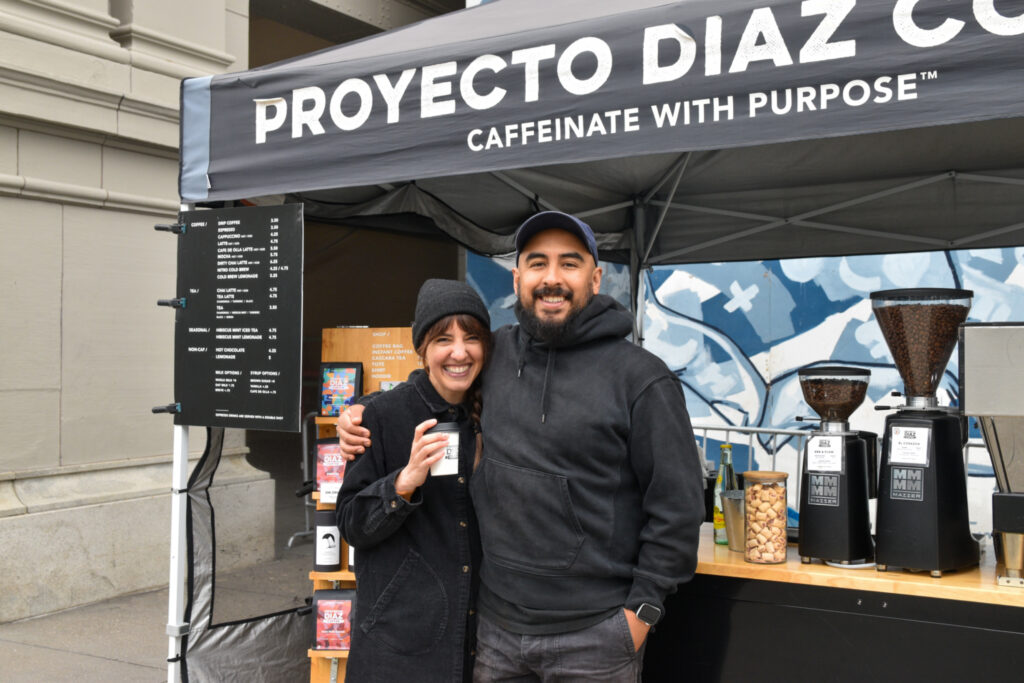
Latine Americans make up over half of all agricultural workers in the United States. As farm operators and food business owners, many are also digging into their agricultural heritage to transform our local food system. In honor of National Latine Heritage Month (which runs September 15-October 15), we are spotlighting a few stories from our Latine farmers market community.
For these farmers and food makers, who you’ll recognize at the Ferry Plaza Farmers Market and Mission Community Market, carrying on their family’s farming legacy connects them with the land and their cultural heritage. They’re also honoring sustainability practices used on their families’ farms in Mexico, while bringing their own vision for our food future here in California.
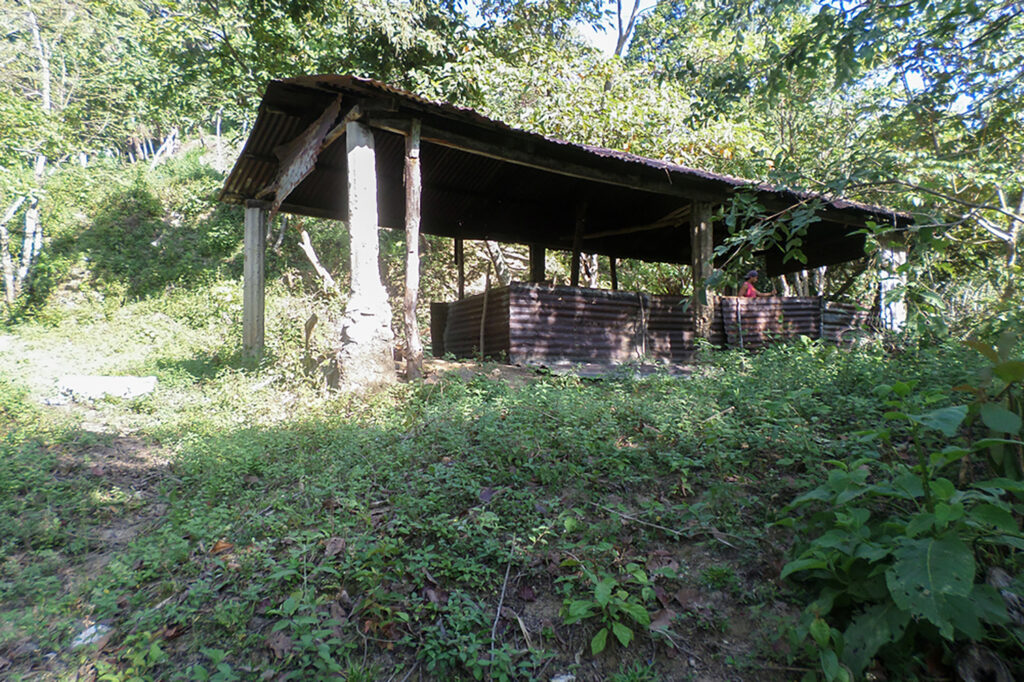
Proyecto Diaz Coffee: Connecting Five Generations Through Shade-Grown Coffee
Fernando Diaz, founder of Proyecto Diaz Coffee, grew up in California hearing about his grandfather Juan Leovigildo Diaz’s coffee farm in Oaxaca, Mexico. The farm was started by Fernando’s great great grandfather in the early 1900s.
“Ever since I was a kid, I always had it in the back of my mind that I wanted to somehow be incorporated into my grandfather’s world,” says Fernando. After graduating and working for a bit, he says, “I started looking for a way to get more connected to my family roots.”
He’s now the fifth generation to be involved in the coffee farming business. “It’s a lot of family plots that have been passed down,” says Fernando about coffee farming in Oaxaca. “A lot of it is shade-grown coffee.” When he visits, he notices a lot of agroforestry practices, such as coffee shrubs being grown under the canopies of banana and mango trees.
Agroforestry and intercropping has long been practiced by Mexico’s Indigenous farmers. While sun-grown coffee may provide higher yields, shade-grown coffee measures better for environmental sustainability by nurturing higher biodiversity, healthier soil, and more carbon sequestration, and it naturally controls pests and improves pollination.
Fernando also notices a closed loop on his grandfather’s farm that further supports soil health. “When the coffee gets picked there’s the meat and a coffee skin that’s around the actual coffee bean,” Fernando explains. After the fruit is picked, the leftover skins are left out and collected to be used as a topsoil compost that nourishes the growing plants.
Today, coffee connects Fernando to his family’s heritage, and 10 percent of Proyecto Diaz Coffee’s profits are invested back into his family’s farm, El Carmen. You can taste the fruits of the family’s labor in the eponymous single-origin coffee. “It gives me a reason to keep going back and checking in on the farm and keeps me rooted to my family’s place of origin, Oaxaca, Mexico,” says Fernando. “So, it’s a very practical and intentional way for me to stay rooted, with coffee.”
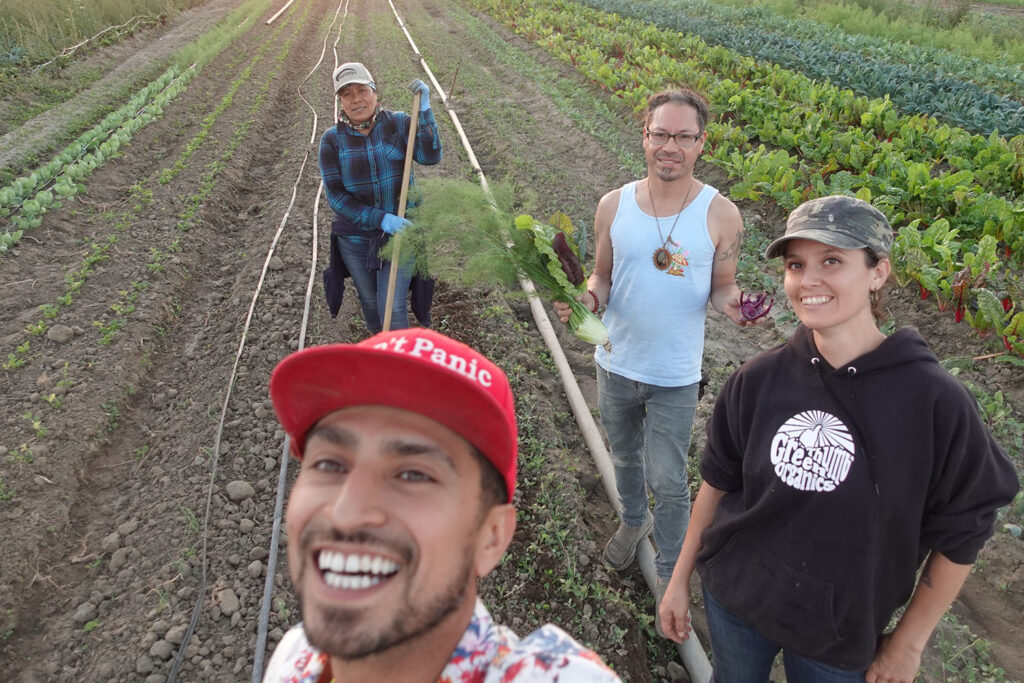
Green Thumb Farms: Cultivating Leadership Through Intentional Farming
Fourth-generation farmer Rudy Jimenez was drawn to farming as a way of deepening his relationship with nature. He shares that operating Green Thumb Farms helps him cultivate growth and respect not just for the land, but also for himself and his ancestors.
Rudy started farming with his father, Rodolfo, and they founded Green Thumb together in 2017. When Rodolfo suddenly passed away two years ago, Rudy’s perception of farming shifted as he took on more of the business responsibilities. He contrasts his experience farming in San Juan Bautista, California, to what he’s seen while visiting his grandfather’s subsistence farm in Guanajuato, Mexico. He says, “They are growing for their own benefit of having access to their own food. Here [in the U.S.], it’s more like, ‘How do you navigate and build a business?’”
Still, he stays true to what’s best for him and his farm by choosing some more traditional and sustainable practices, such as doing most things on the farm by hand. “I’m a hands-on person,” he says, “I look at a lot of details, so, I think it’s very important to put your hands in there.” Minimizing machinery use is also better for soil health in the long term.
“It’s an honor to work with the land and be able to share our experience taking care of the soil. Sharing the land and caring for it unites us more.” He says that farming also helps him connect to his heritage because “it brings together a lot of practices in the ways we connect at the table and how we build relationships.”
Now a father himself with a son named Rodolfo, Rudy carries on his father’s and grandfather’s legacies, while considering how to guide future generations. “For people of color, we’re always in the back of the scene, so I feel it’s important for us to take leadership roles for the future of the food industry,” he says. “We need more younger farmers. What’s going to be the future in 20 years for our food system?”
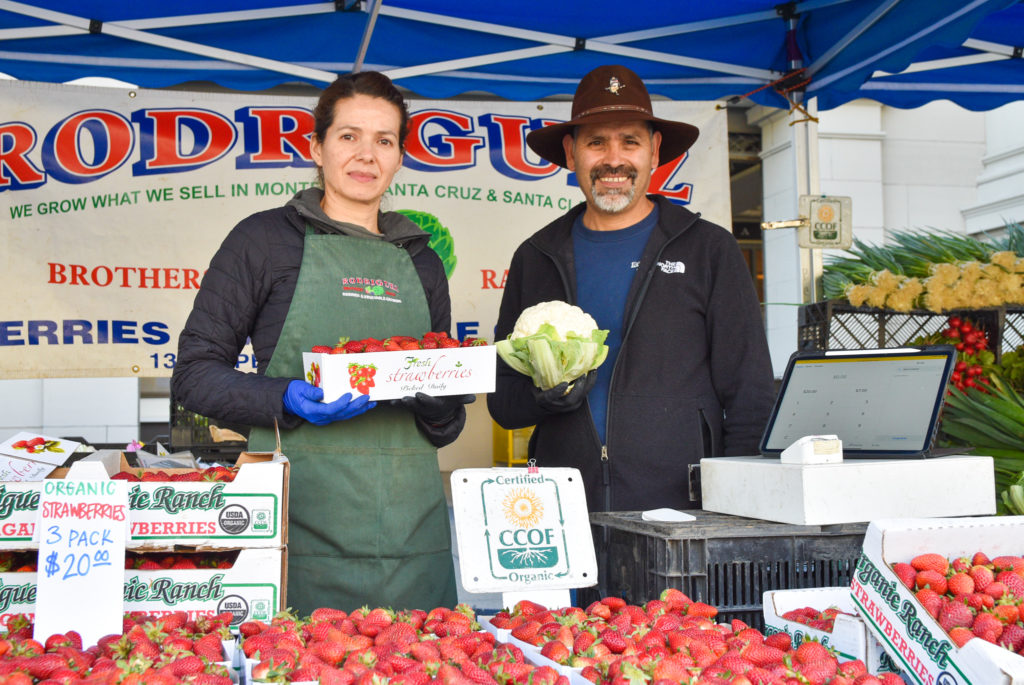
Rodriguez Bros Ranch: Returning to (Organic) Family Practices
Another farmer carrying on his family’s legacy, Roberto Rodriguez co-owns Rodriguez Bros Ranch with his brother, Manuel. They grew up in Michoacán, Mexico, where their grandfather farmed. Both brothers first attempted to follow in their father’s footsteps as bus drivers, before turning their focus to farming like their grandfather.
They immigrated to the United States in the 1990s, and before starting their own farm, they worked as pickers in strawberry fields. In California, more than 75% of the strawberry workforce, including management and field workers, are Latino.
Strawberries are at the top of Environmental Working Group’s Dirty Dozen in terms of pesticide use, which means that Latino farmworkers in conventional farms can face high exposure and health risks. Farmworker safety may have influenced Roberto and Manuel’s decision to transition to organic practices on their own farm.
After nearly 10 years as pickers, the brothers were able to rent their own farmland in Watsonville. “When we started farming here in California, we started doing it conventionally,” says Roberto. “But then, when we decided to go organic, we realized the way we were working with my grandpa back in Mexico was very close to the way we do organic farming here.”
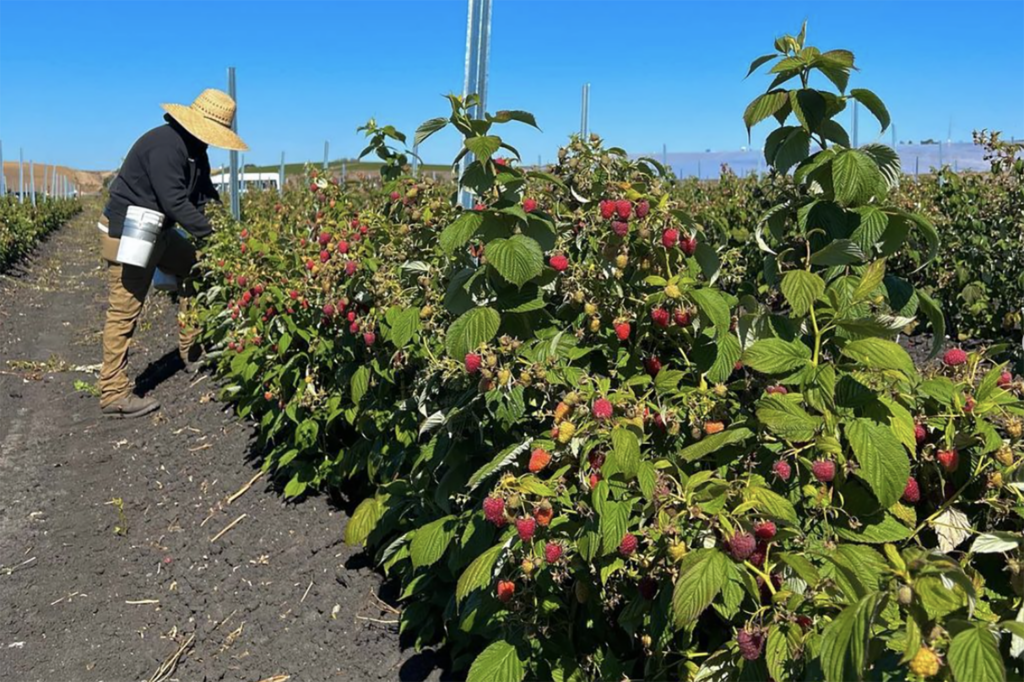
On the farm, they grow a range of fruits and vegetables. At the farmers market during summertime, their stall is characterized by brightly colored strawberries, pink and golden raspberries, and blackberries. And, during most of the year, you can pick from heaps of vegetables, from leafy greens like kale and chard, and roots like carrots and onions.
“We’re feeding this country,” says Roberto about being a Mexican American farmer. “I’m proud to be who I am.”
Support Proyecto Diaz Coffee at the Ferry Plaza Farmers Market on Tuesdays, Thursdays, and Saturdays. Support Green Thumb Farms at the Ferry Plaza Farmers Market on Tuesdays and Saturdays, and at the Mission Community Market on Thursdays. Support Rodriguez Bros Ranch at the Ferry Plaza Farmers Market on Tuesdays and Thursdays.
Also see our lists of Latine farms and food businesses to celebrate at Foodwise’s farmers market.
Tomorrow, stop by the Foodwise Classroom for two cooking demos by Latine chefs, featuring the seasonal bounty of the farmers market: Malena Lopez-Maggi, founder of The Xocolate Bar, at 11am, and Raquel Goldman, founder of Norte54 at 12pm.
Topics: Environment, Farmers, Organic, Small business
